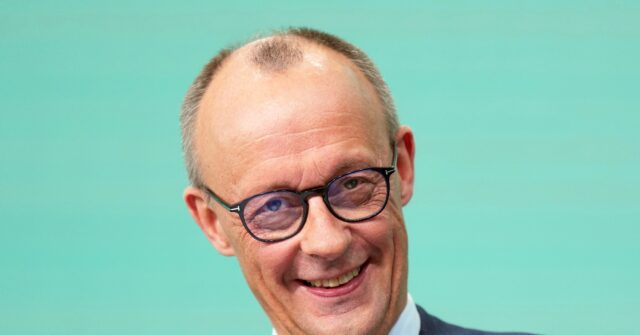


Hours after his party’s victory in Germany’s federal elections, likely incoming chancellor Friedrich Merz began to soften his stance on immigration as he looks to form a coalition with leftist parties rather than the anti-mass migration Alternative for Germany.
While Merz campaigned as a supposed immigration hardliner, the successor to Angela Merkel as the leader of the Christian Democrats and the likely next leader of the country appears to be following the tradition of notionally right-wing politicians abandoning their election-time promises once the votes have been counted.
Ahead of the election, Merz put forward a plan to increase deportations and enact strict border restrictions to prevent illegal migrants from entering Germany from other EU nations, including those who claim to be asylum seekers. He argued that such restrictions should be made permanent and was joined in a controversial vote by the AfD. However, after winning the election on Sunday, Merz said that such measures should only be “temporary”, broadcaster NTV reports.
“None of us wants to close the borders,” Merz claimed on Monday in a blatant attempt to court the establishment leftist Social Democrats to form a new government. During the campaign, the leftist parties argued that enacting border controls with its neighbours would be a violation of EU rules and, therefore, refused to support his plan.
The SPD was roundly rejected by German voters on Sunday, the party suffering its worst electoral loss since the Second World War. For the first time, it has come third place rather than first or second, possibly heralding the very end of the two-party system. Nevertheless, Merz appears intent on continuing the “firewall” around the AfD, in which establishment parties in Berlin refuse to work with the populist-right party.
This likely means Merz will need to temper his positions to court the Social Democrats. Indeed, SPD leader Lars Klingbeil said on Monday that he expects that “Merz will change his course and his tone significantly” from the campaign if he hopes to form a government with the left-wing party. The SPD will also likely look to pressure Merz to ignore Germany’s limits on debt, as it seeks to expand welfare and funding for Ukraine.
Should Merz succeed in wooing the ousted SPD back into government with his CDU, it would mark the return of the so-called “grand coalition” that governed the country during the European Migrant Crisis of 2015, which was facilitated in large part by the then-Angela Merkel-led government in Berlin.
AfD leader Alice Weidel branded the likely chancellor’s comments as an acknowledgement of “election fraud” from the CDU leader, saying that he “threw all his election promises overboard.”
“[Merz] no longer wants to close the borders and wants to talk to the Greens and SPD about reforming the debt brake. This is politics against the will of the voters!”
The issue of migration played a central role in the collapse of the former left-wing government, with a string of migrant terror attacks breaking out across Germany over the past year, including in Mannheim, Solingen, Magdeburg, Aschaffenburg, and Munich.
After Merz doubled down on his pledge to seek a coalition with the SPD rather than with the AfD, Weidel predicted that Merz would become merely an “interim” chancellor and that his government would not last its full term, given that it would have to bend to the leftist agenda that voters rejected on Sunday.
Merz is also facing challenge from within his own party, with powerful Minister-President of the state of North Rhine-Westphalia, Hendrik Wüst calling for a significant increase in deportations, saying: “We need full planes every week that take people to where they are already entitled to an asylum procedure in Europe.”
Wüst argued that Berlin needs to take the lead in reforming EU immigration policy, including increased external border protections, the registration of people who enter the bloc, and particularly the Dublin Regulation which stipulates that supposed refugees should apply for asylum in the first EU nation they arrive in.
“We can’t just let it continue like this at random,” he said.
